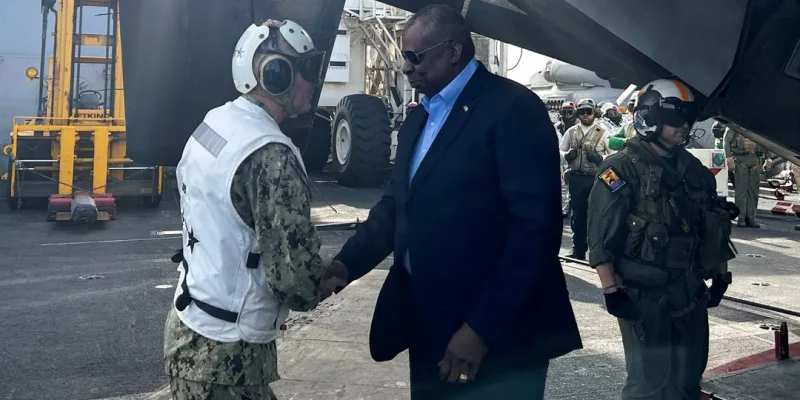U.S. Defense Secretary Lloyd Austin visited the Gerald R. Ford aircraft carrier in the eastern Mediterranean Sea on Wednesday and thanked its crew for their role in helping prevent a broader conflict in the Middle East during the Israel-Hamas war.
The nuclear-powered Ford, a small, floating city of over 4,000 people with eight squadrons of aircraft, became a powerful symbol of American resolve by rushing closer to Israel after it was attacked by the Palestinian militant group Hamas on Oct. 7.
Austin has extended the Ford’s deployment three times, hoping its presence would make Iran and Iran-aligned groups — particularly Lebanon’s Hezbollah — think twice before joining the fight against Israel.
“This carrier and crew are making history. Sometimes our greatest achievements are the bad things that we stop from happening,” Austin said in an all-hands call broadcast over the ship’s intercom.
“And at a moment of huge tensions in the region, you all have been the lynchpin to preventing a wider regional conflict.”
He later told reporters travelling with him: “One of our goals is to make sure that the crisis in Gaza does not expand into a regional conflict. And I think we’ve done a good job of managing that.”
How much longer the Ford stays in the eastern Mediterranean is unclear, as is whether it will depart for its home port in Virginia before Israel moves from high-intensity combat in Gaza to a more limited phase of the war to dismantle Hamas.
Austin discussed planning for the transition with Israeli leaders on Monday in Tel Aviv, with an international outcry mounting over the high civilian death toll in Gaza.
Asked whether the risk of regional war would be reduced when and if Israel shifts to a lower-intensity campaign in Gaza, Austin said on Wednesday: “If that happens… it’s hard to speculate but I think it’s logical that…we would see some reduction in activity.”
When Israel might start the transition is unclear, and Austin told reporters while in Israel that he was not there to dictate timelines to the close American ally.

MARITIME SECURITY INITIATIVE
Until regional tensions subside, Austin must consider what more the U.S. and its partners can do to deter Iran’s allies in Lebanon, Iraq, Syria and Yemen — all of whom are trying to impose costs on Israel and Washington over the Gaza conflict.
In Iraq and Syria, U.S. troops have endured drone and rocket attacks by Iran-backed militia.
Iran-aligned Houthis in Yemen have disrupted global trade by attacking commercial tankers and container ships in the Red Sea with drones and missiles.
On Tuesday, Austin announced the creation of a maritime security initiative to respond to the attacks. Houthi leader Abdel-Malek al-Houthi said on Wednesday the group would start firing missiles at U.S. warships if Washington got more involved in its affairs or targeted Yemen.
During his Middle East trip, Austin also met senior leaders in Qatar, which helped broker a ceasefire between Israel and Hamas and has an open line of communication to both nations.
U.S. and Israeli officials say the rapid deployment of the Ford and other assets after the Israel-Hamas war began sent a critical message to Hezbollah, warning it of the costs of opening a major new front for Israel.
Even so, experts say tensions along the Israel-Lebanon border are still high and Israel remains concerned about a possible ground incursion in the north.
The Ford is the U.S. Navy’s newest aircraft carrier. Its air wing has carried out more than 8,000 sorties, more than a quarter of them since repositioning to the eastern Mediterranean.
Captain Rick Burgess, the commanding officer, acknowledged that extending the vessel’s deployment over the festive holidays hit the crew hard at first, but that they were doing well now.
“I think everyone went through a few days of just getting through it,” Burgess told reporters.
More than 3.5 million meals have been served on the aircraft carrier, and the crew has consumed more than 155,000 Red Bull energy drinks, the military says.
“I’m honestly not sure what I find more impressive: That you’ve racked up more than 15,000 flight hours, or that you’ve consumed more than 155,000 Red Bulls,” Austin said.








Comments